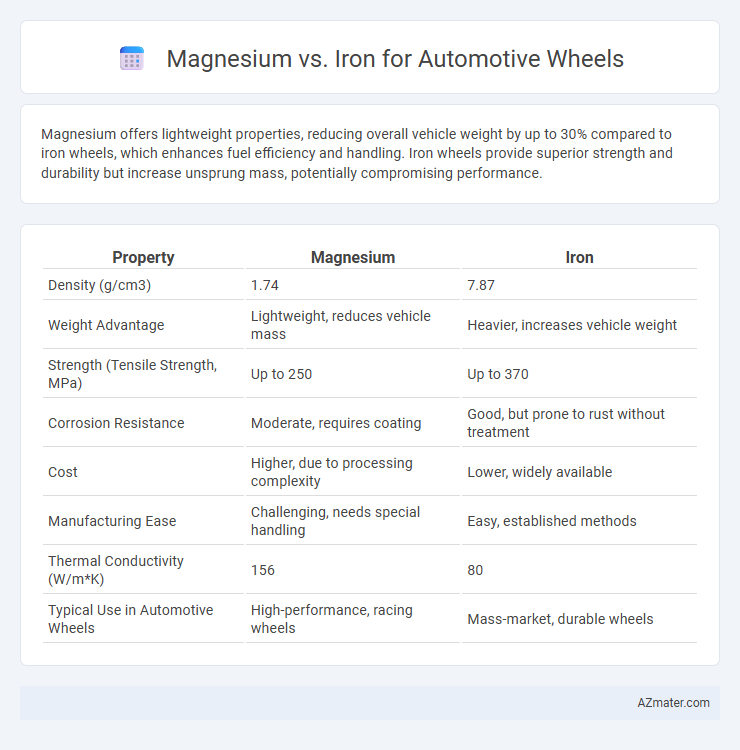Magnesium offers lightweight properties, reducing overall vehicle weight by up to 30% compared to iron wheels, which enhances fuel efficiency and handling. Iron wheels provide superior strength and durability but increase unsprung mass, potentially compromising performance.
Table of Comparison
| Property | Magnesium | Iron |
|---|---|---|
| Density (g/cm3) | 1.74 | 7.87 |
| Weight Advantage | Lightweight, reduces vehicle mass | Heavier, increases vehicle weight |
| Strength (Tensile Strength, MPa) | Up to 250 | Up to 370 |
| Corrosion Resistance | Moderate, requires coating | Good, but prone to rust without treatment |
| Cost | Higher, due to processing complexity | Lower, widely available |
| Manufacturing Ease | Challenging, needs special handling | Easy, established methods |
| Thermal Conductivity (W/m*K) | 156 | 80 |
| Typical Use in Automotive Wheels | High-performance, racing wheels | Mass-market, durable wheels |
Introduction: Magnesium vs Iron Wheels
Magnesium and iron are two prominent materials used in automotive wheel manufacturing, each offering distinct advantages in weight and strength. Magnesium wheels are significantly lighter, improving vehicle performance and fuel efficiency, while iron wheels provide superior durability and impact resistance. Selecting between magnesium and iron wheels influences handling characteristics, maintenance requirements, and overall cost.
Material Composition and Properties
Magnesium alloys, characterized by low density (around 1.8 g/cm3), offer superior weight reduction compared to iron, which has a density of approximately 7.8 g/cm3, making magnesium wheels significantly lighter and enhancing fuel efficiency. Iron wheels, typically made from cast iron or steel, provide higher tensile strength and better wear resistance due to their denser microstructure, ensuring durability and impact resistance in rough driving conditions. The corrosion resistance of magnesium alloys is generally lower than iron alloys, requiring protective coatings to improve longevity in automotive applications.
Weight Comparison: Magnesium vs Iron
Magnesium wheels weigh approximately 35-50% less than iron wheels, significantly reducing the unsprung mass and enhancing vehicle performance. The density of magnesium is about 1.74 g/cm3 compared to iron's 7.87 g/cm3, making magnesium one of the lightest structural metals used in automotive applications. This substantial weight advantage contributes to improved acceleration, braking, and fuel efficiency in vehicles equipped with magnesium wheels.
Strength and Durability Factors
Magnesium wheels offer lightweight properties that enhance vehicle performance but generally exhibit lower tensile strength and corrosion resistance compared to iron wheels. Iron wheels provide superior durability due to higher hardness and impact resistance, making them more suitable for heavy-duty automotive applications. The choice between magnesium and iron wheels hinges on balancing weight reduction with long-term strength and structural integrity requirements.
Performance Impact on Vehicles
Magnesium wheels offer superior lightweight properties compared to iron wheels, significantly reducing unsprung mass and improving vehicle acceleration, braking, and handling. While iron wheels provide greater durability and resistance to corrosion, their heavier weight negatively impacts fuel efficiency and suspension responsiveness. The performance advantage of magnesium wheels is particularly beneficial in high-performance and racing vehicles where agility and speed are critical.
Corrosion Resistance and Longevity
Magnesium wheels offer superior corrosion resistance due to their natural oxide layer, which protects against rust but may require protective coatings in harsh environments. Iron wheels demonstrate excellent longevity from their high strength and resistance to wear but are prone to rust if not properly treated with anti-corrosion coatings. Choosing magnesium enhances corrosion resistance and reduces wheel weight, while iron provides durability and long-term structural integrity under strenuous automotive conditions.
Manufacturing Processes and Costs
Magnesium wheels typically involve die casting or forging processes that offer lighter weight and enhanced performance but come with higher manufacturing costs due to material handling and specialized tooling. Iron wheels are produced using traditional casting or stamping methods that are more cost-effective and suitable for mass production but result in heavier components affecting fuel efficiency and vehicle dynamics. The trade-off between magnesium's high strength-to-weight ratio and elevated production expenses versus iron's affordability and weight impact plays a critical role in automotive wheel manufacturing decisions.
Safety Considerations for Each Material
Magnesium automotive wheels offer reduced weight and improved fuel efficiency but present safety concerns such as lower corrosion resistance and higher flammability under extreme conditions. Iron wheels provide superior strength, durability, and resistance to impact, enhancing safety especially in harsh driving environments, although their heavier weight affects overall vehicle performance. Selecting between magnesium and iron wheels requires balancing weight savings with structural integrity and fire resistance to ensure optimal safety.
Environmental Impacts and Sustainability
Magnesium wheels offer significant environmental benefits due to their lower weight, which improves fuel efficiency and reduces CO2 emissions in vehicles. Iron wheels, while durable and recyclable, tend to be heavier, leading to increased fuel consumption and higher greenhouse gas emissions over the vehicle's lifespan. The sustainability of magnesium is enhanced by its abundant availability and energy-efficient recycling processes compared to iron, which requires more intensive mining and smelting activities that contribute to environmental degradation.
Choosing the Right Wheel Material for Your Car
Magnesium wheels offer exceptional lightweight performance, reducing unsprung weight and enhancing acceleration, braking, and fuel efficiency, making them ideal for sports and high-performance vehicles. Iron wheels provide superior durability and resistance to impact damage, ensuring long-lasting strength and cost-effectiveness for everyday driving and heavy-duty applications. Selecting between magnesium and iron depends on prioritizing either performance benefits or durability and maintenance requirements for your automotive needs.

Infographic: Magnesium vs Iron for Automotive Wheel
 azmater.com
azmater.com